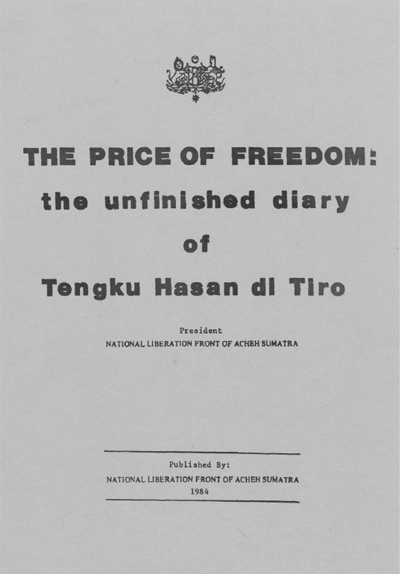The Price of Freedom - the unfinished diary of Tengku Hasan di Tiro

Author(s): Hasan M di Tiro
Publisher: National Liberation Front Of Acheh Sumatra
Published on: Rabi' al-Awwal, 1404 1984-01
No. of Pages: 238
(Book Review appeared in Crescent International, December 15, 1984)
As early as the 15th century, Ibn Khaldun, the great Arab historian reported that a strong Muslim State of Acheh Sumatra existed in East South East Asia. Since then the Achehnese have been giving their lives for the freedom of their State proving themselves worthy warriors of Islam.
When the alien Dutch intruded into the area colonizing Java and its neighbouring islands, they were intent on annexing Acheh Sumatra to their Dutch East Indies. But when they attempted to conquer Acheh Sumatra, its Islamic fervour was roused: the rulers and warriors put up a fierce resistance. The Dutch army suffered a humiliating defeat at the Battle of Bandor Acheh when they declared war in 1873.
In those days of European colonial invincibility, this reversal of fortune was a devastating blow to European prestige. The Times (London) and the New York Times noted the 'decisive victory' and the 'great slaughter' in which the Dutch general was killed and his army 'put to disastrous flight'.
Although the Dutch consolidated their colonial rule over the vast sprawling archipelago -Indonesia- for more than 350 years, the Achehnese jealously guarded their identity and fought tenaciously for an independent Islamic State. Since sovereignty was handed over to the Javanese-dominated regime in Jakarta on December 27, 1949, continuous conflict has become a permanent feature of the region. The Achehnese have been pitted against the Javanese regime and its US-trained forces who attempted a virtual genocide has a vested interest in its rich resources of petroleum and natural gas.
Hardly any books - sympathetic to the Achehnese cause- exist on the stark realities of this bloody war that has raged at regular intervals. The sacrifice in blood and seat of the declaration of independence of Sumatra on December 4, 1976 by the National Liberation Front (NLF). Members of the Darul Islam movement in Sumatra had regrouped under the leadership of Tengku Hasan di Tiro to fight the neo-colonial Indonesians in order to set up an Islamic State.
The diary of NLF President Hasan di Tiro gives a vivid account of the war fought in the snake and leech infested jungle and mountainous terrain. He moved through the entire region with a small force to declare the independence of Acheh Sumatra as an Islamic State. The date was selected for its symbolic importance. The Dutch had killed the last head of the Independent State on December 4, 1911.
Hasan di Tiro often came under fire from the Javanese forces sometimes losing many of his men. Their food supplies were so low that they lived on porridge and boiled waters sweetened with saccharin. Spies infiltrated their camp, they found villages living under a reign of terror.
In raid after raid people were arrested, tortured and shot in front of their families. Men and women were stripped in public. High voltage electricity was applied to genitals. Salt and acid were rubbed on open wounds. The victims' hands and feet were tied and pulled in different directions. Burning with lighted cigarettes, forcing into baths of human excrement, burying alive, inserting needles under finger nails, beating with iron bars and breaking ribs and bones were other forms of torture. The aim of the Indonesian forces was to search and destroy the NLF and its supporters.
The military is armed with modern rifles, armoured vehicles, aircraft and helicopters which spot NLF camps. But tyranny, no matter how well equipped, has never triumphed over Islam. The people's faith is so strong and they have capable Islamic leaders under the di Tiro family, most of whose stalwarts died in battle against the Dutch.
Hasan di Tiro recalls that during his trek his party got an overwhelming response wherever they went. 'The most important thing is to know that your people are with you'. (p.215) 'If the people are with you and their Islam is intact', Hasan observes, 'our organization in the country can no longer be shaken whatever happens in the hills' (p.216) and 'our political strength is such that with a few thousand modern rifles we can have our country back'. (p.216)
The diary is no ordinary record. It is an Islamic fighter's observations which sum up the principles of guerilla warfare. Without the people, organizations, no liberation movement can be successful. Che Guevera also wrote his diary while fighting in the jungles of Latin America. But his group lacked peasant support and above all there was no common ideology between him and the peasants. Hasan di Tiro's record in Acheh Sumatra shows that strong Islamic brotherhood exists between the people and the NLF. The Indonesian regime may rule the area by force, but Hasan gets complete respect from Fellow Muslims.
Needless to say that this diary is a unique record as few, if any, Islamic fighters have written down their memoirs for posterity. It is not only inspiring for the Achehnese but also for other Muslims. Those who read it will realize that liberation from secular forces is not needed in Acheh alone but in other Muslim States as well. Such a publication should be in a pocket size paperback edition for wide circulation. This intimate record with its profound observations transports the reader into the jungles of Acheh Sumatra and makes Hasan di Tiro's struggle every Muslim's struggle.
